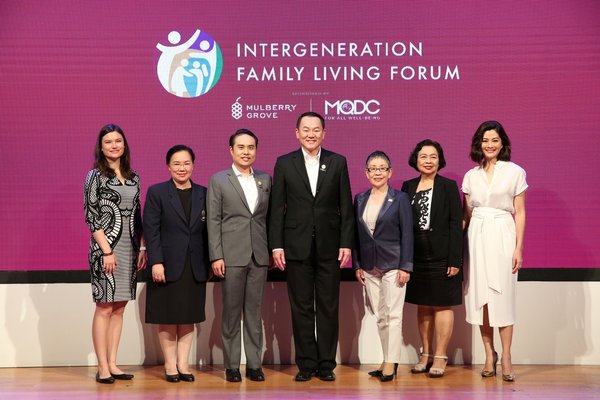BANGKOK, June 4, 2019 /PRNewswire/ -- Mulberry Grove by Magnolia Quality Development Corporation Limited (MQDC), a leading property developer in Thailand, recently held "INTERGENERATIN FAMILY LIVING FORUM", one of the year's standout events, gathering well-known Thai and international experts to speak on the Intergeneration Family trend and share the results of the first major survey on Thai attitudes to multigenerational family living.

Mr. Keerin Chutumstid, President, Property & Service Business Group of MQDC, said that MQDC follows a philosophy "For all well-being" to conduct business with social responsibility. The property developer studies every aspect of living carefully to develop properties that satisfy residents and boost their well-being. The forum has been organized to help develop high-quality residences in harmony with the living preferences of families who want to live together happily as several generations during economic and social change.
Moreover, the forum highlights the importance of family bonds, living values, relationships, and family time as well as knowledge transfer from generation to generation through presenting research results and expert views with the hope that its audience can find information to plan their lives and housing in the long term.
Asst. Prof. Pimonpan Isarabhakdi, Ph.D., the consultant and special professor of Institute for Population and Social Research, Mahidol University, shared the results of the institute's survey of 400 respondents nationwide between 15 and 65 years in May 2019. The study found that 70.8% of the sample wants to live in an intergeneration household. This preference was especially strong in those over 40, of whom 80.7% held this view. Of respondents living in 4-generation families, 92% expressed a preference for intergeneration family living. In 3-generation families, the figure was 78.9%. Moreover, it was found that the households with 3 generations tend to boost the psychological well-being of family members more than other compositions.
Ms. Keiko Sugi, CEO, Director of Total Quality Management Office at Social Welfare Corporation KOTOEN, an expert in social care from Japan, said that for over a decade many countries have focused on the issues of an aging society, especially property projects for independent aging citizens who live alone without support from their relatives. These residences for aging people or nursing homes are therefore not enough to meet demand and their services are inadequate, impacting on quality of life and creating isolation. Residential projects must improve to focus on the intergeneration family model, Ms. Sugi said.
Assoc. Prof. Vipan Prachuabmoh, Ph.D., Dean of College of Population Studies, Chulalongkorn University, said that last year 11.7 million of Thais were 60 or over, or 16.9% of the population. The proportion of old people is constantly rising. Thailand should therefore have better options for elderly nursing care focused on building relationships within families, not sending older adults to nursing homes or other institutions. Japan is the best example for elderly care because its system provides care to keep older adults at home as much as possible.
"It's human nature for people to need love and care, especially from family members. Most of the elderly, especially ones at the end of life, want to return home while their children need to be loved and cared for too. When the elderly are able to live with their grandchildren, the family's relationships will strengthen. Older adults will therefore have important roles to boost family warmth, encouraging their children and becoming a focal point for all family members, making the family stronger," said Assoc. Prof. Prachuabmoh.
Ms. Samantha Allen, Director, IWBI Asia, International WELL Building Institute (IWBI), draws from a background of research in both psychology and environmental science to aid overall market development, education, and greater adoption of the WELL Building Standard and WELL Community Standard in the Asia Pacific region.
"Growing up in Asia, it was normal to have three generations in a household, and in my own home, my grandmother was my third parent. I saw from an early age the discrepancies and commonalities in health and well-being needs across different life stages -- and that has demonstrated to me the importance of having a physical environment that supports those needs. I believe that the WELL Building Standard provides guiding principles that support built environments suitable for all ages," Ms. Allen said.
Mr. Roongrote Chongsujipan, Senior Vice President of Mulberry Grove at Magnolia Quality Development Corporation Limited (MQDC), said that looking back to the fundamentals of the Asian or Thai family, the structure has clearly changed from extended families with 3-4 generations to nuclear families since the end of the Baby Boom. Baby Boomers are currently becoming older adults of 55 years and over, most living in modern smaller family households. Changing economic and social factors bringing high competition at work have led many to seek to live near their workplaces or convenient travel. This trend is reducing family's relationships and extends the distance between family members.
"With a strong conviction that family warmth and strong family bonds matter most, Mulberry Grove by MQDC has used research to develop our property to ensure we can provide happiness and well-being for all generations," said Mr. Chongsujipan.
About Mulberry Grove
Mulberry Grove is developing Thailand's first super-luxury intergeneration family residences to bring back the true joy of family life. Based on extensive research, Mulberry Grove residences will support warm and fulfilling relationships, meeting the needs of every generation for sustainable well-being. The MQDC brand's first residences are now underway in several locations in Bangkok.
About Magnolia Quality Development Corporation Limited (MQDC)
Magnolia Quality Development Corporation Limited (MQDC) is a property developer that develops, invests in, and manages residential, mixed-use, commercial, and hotel projects with a corporate commitment 'for all well-being'.
MQDC brands include Magnolias, Whizdom, The Aspen Tree, and Mulberry Grove, catering for a range of healthy, sustainable lifestyles.
The company provides an industry-leading 30-year warranty on its residential units in line with its exceptional construction standards.
For more information, visit www.mqdc.com.